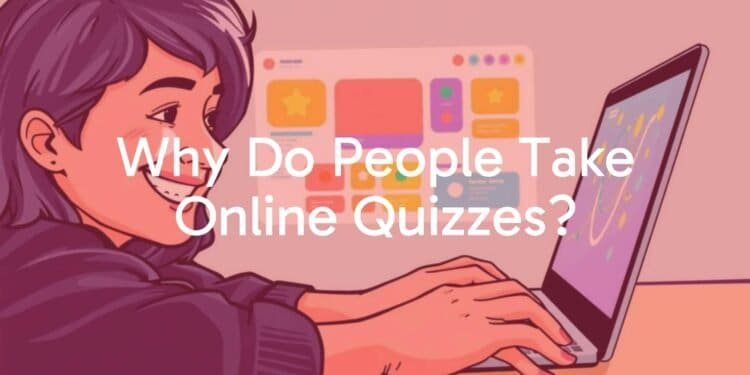People take online quizzes for a mix of reasons, including having fun, learning about themselves, and connecting with others. Unlike regular forms or surveys that often seem boring, quizzes are interactive and provide instant results, which can feel rewarding and personal. They appeal to basic human interests-from simple curiosity to wanting validation and a sense of belonging-making them a favorite online activity for many.

What makes people want to take online quizzes?
Online quizzes attract people for several reasons, offering quick answers and enjoyable experiences. It isn’t just something to do when bored; there’s something about quizzes that makes them especially attractive and hard to resist.
Curiosity and wanting quick answers
People are naturally curious, especially about themselves or topics they find interesting. Online quizzes allow people to satisfy this curiosity quickly, giving immediate feedback and answers. Whether it’s “What type of friend are you?” or “Which famous figure matches your personality?”, the promise of finding out something right away is a big reason people take these quizzes. This instant feedback makes quizzes feel more satisfying than many other online activities.
Getting results instantly fits well with our fast-moving digital lifestyles. This quick reward keeps people interested and makes them likely to try more quizzes.

Learning about themselves
People have always been interested in understanding themselves better. Quizzes make it easy and fun to think about personality, preferences, and habits. Even if the results are not deeply scientific, the process lets people reflect on who they are in a light, enjoyable way.
Just answering questions about personal likes or beliefs can be a form of self-reflection. It offers a chance to think about different sides of who they are, sometimes in ways they haven’t before. This simple self-exploration can feel rewarding by itself.
Enjoyment and involvement
In a sea of online content, quizzes are popular because they are interactive and keep people involved. Instead of just reading or watching, quizzes ask users to participate, making the experience more interesting and active.
Some quizzes are funny or silly, while others are serious; either way, they make for a good break and a bit of fun. The enjoyment and challenge they offer draw people in, making quizzes a popular way to pass time online.
Personalized results
Many online quizzes give results that are made to feel unique to each user. Instead of generic feedback, the quiz gives answers that seem specific to the person taking it-like a custom suggestion or a personal insight.
This personal touch makes people feel noticed and understood, which is more special than standard online content. The more the result feels right, the more memorable and meaningful the quiz is for the user.
Sharing and connecting with others
People like to connect with friends and family, and sharing quiz results can be an easy way to do this. When someone takes a quiz, they often want to show their result to others, which can start conversations and help people bond.
Sharing quiz results isn’t just about bragging; it’s a way to express identity, discuss shared interests, and joke or debate with others. Quizzes make it easy to connect and create shared moments online.

Which psychological reasons drive quiz participation?
Besides the obvious reasons, there are deeper psychological factors that make people start and finish online quizzes.
Looking for approval and self-worth
A lot of quizzes, especially personality quizzes, are made to give positive feedback. They tend to praise or highlight special qualities in the user, which can boost self-esteem.
Getting a quiz result that matches how someone wants to see themselves, or even shows a new possible strength, feels good. This little reward encourages people to keep taking similar quizzes and to share their good results with others.
Instant rewards and pleasure chemicals
People now expect immediate rewards in the online world, and quizzes provide this. Every answer, every step of progress, and especially the final result offers small feelings of pleasure, thanks to chemicals in the brain like dopamine.
The quiz is a series of these little rewards, keeping users interested until the end. This setup makes people want to keep taking quizzes, as they enjoy the instant good feeling it gives.
Building habits by repeating the activity
The constant availability and fun of online quizzes mean people can easily get into the habit of taking them. Positive experiences like learning something new, having fun, or connecting with others make people want to do it again.
Websites that post many quizzes-especially ones with similar topics or styles-encourage people to return often. Over time, quizzes can become a regular part of how people spend their time online.
How do online quizzes help users?
While many see online quizzes just as entertainment, they also offer other real and not-so-obvious benefits.
Learning new things
Some quizzes help people learn new facts or skills. For example, news websites use quizzes to help readers remember and understand current events. Other quizzes test knowledge on many subjects, helping users find gaps in what they know.
In schools or work, quizzes are valuable for helping people remember information and see what they need to work on. The act of trying to recall facts and getting feedback helps reinforce learning in a simple, low-pressure way.
Building confidence and feeling recognized
Doing well on a quiz, especially one that tests knowledge or gives a nice result, can boost self-confidence. It feels good to get a positive answer, even if the quiz is only for fun. Sharing these results with others can bring even more positive feedback, making people feel special and valued.
Knowing you got something “right” or have special qualities can make you feel good about yourself, and sharing this can bring more encouragement from friends or followers.
Confirming what we already think about ourselves
Sometimes, people take quizzes to see if their results match what they already believe about themselves. If a quiz result lines up with a person’s self-image, it feels reassuring and can strengthen their sense of who they are.
This kind of confirmation provides comfort and can make a person feel certain in their traits or beliefs-even if the quiz is simple or not scientific.
Making choices easier
With so many choices online and in life, it’s often hard to decide what to pick. Some quizzes help by narrowing down options, like suggesting what kind of coffee to try, which book to read, or which career might suit you best.
By answering a few questions and getting a suggestion, these quizzes save people the trouble of doing a lot of research or thinking. This simplifies decision-making and helps people feel more sure about their choices.

| Benefit | How Quizzes Help |
|---|---|
| Learning New Facts | Quizzes teach and reinforce knowledge on many topics. |
| Increasing Confidence | Positive results or good performance boost self-esteem. |
| Making Decisions Easier | Quizzes narrow choices and offer suggestions based on answers. |
| Social Bonding | Sharing results helps connect with others and build communities. |
Why are online quizzes so popular on social media?
Quizzes fit perfectly with social media because they’re easy to share and get people talking.
Helping people share about themselves
Social media is built around self-expression, and quizzes make it easy for users to talk about themselves in a fun way. Studies show people enjoy sharing personal details. Quizzes give a structured way to share bits of personality or interests without seeming self-centered.
This makes it easy for people to describe themselves, highlight their unique points, or even poke fun at themselves. It encourages sharing and fits into the way people use social networks.
Building groups around quiz results
Quiz results often create a sense of belonging among people who get the same or similar outcomes. Whether it’s finding out you’re in the same “Hogwarts house” or have the same personality type, these shared results create easy conversation starters and help people connect.
This shared experience can lead to stronger friendships and online communities, as people come together around common quiz results.
Encouraging sharing and activity online
Many quizzes are made to be shared. When a user posts a quiz result, it naturally catches the eye of others, who are then likely to try it for themselves. This creates a snowball effect, making quizzes spread quickly and encouraging more engagement on social platforms.
Sharing is often just a click away, making quizzes one of the easiest and most effective ways to boost interaction and traffic on social media.
What could be the risks of taking online quizzes?
Even though online quizzes are mostly light-hearted and fun, there are some possible negative sides to keep in mind.
Worries about privacy and personal data
One big problem with online quizzes, especially those on social media, is that they may ask for private information. Some quizzes are designed to collect your data for marketing purposes, while others can be more harmful, trying to get details that could help someone hack your accounts.
Some quizzes might ask for answers that are often used in security questions (like the name of your pets or your first school). Sharing this information can put you at risk of stolen identities or account hacks. It’s best to be careful and not give out real personal info or connect quizzes to your main social profiles or email, especially if you don’t trust the quiz maker.

Wrong or misleading information
Not all quizzes are accurate. While some are educational or well-made, others are just for fun or created to gather your data. If quizzes give out incorrect facts, especially about serious subjects, users can be misled.
Personality quizzes, in particular, often give overly simple or flattering responses that might not be true. Relying on these for self-understanding can cause confusion about who you really are. It’s always smart to remember that most online quizzes aren’t scientific or detailed assessments.
Relying too much on outside approval
The positive responses and praise quizzes give can become something people depend on for self-esteem. If someone always looks to quizzes for good feelings about themselves, it can weaken their own self-value.
This can also go the other way-if a result is negative, it may leave users feeling bad. Healthy self-respect should come from life experiences, not just from quiz answers. Finding a balance between fun quizzes and real self-worth is important.
Main points about why people take online quizzes
Online quizzes have become a steady part of our online experience, not just a passing trend. They appeal to people because they are enjoyable, quick, and personal. Quizzes fit many needs, including entertainment, learning, and sharing.
As technology grows, quizzes will probably get even more advanced, using AI to make results feel even more personal and making the experience more interactive. Quizzes will likely keep adapting and stay popular as a way for people to learn, have fun, and connect with others.









































